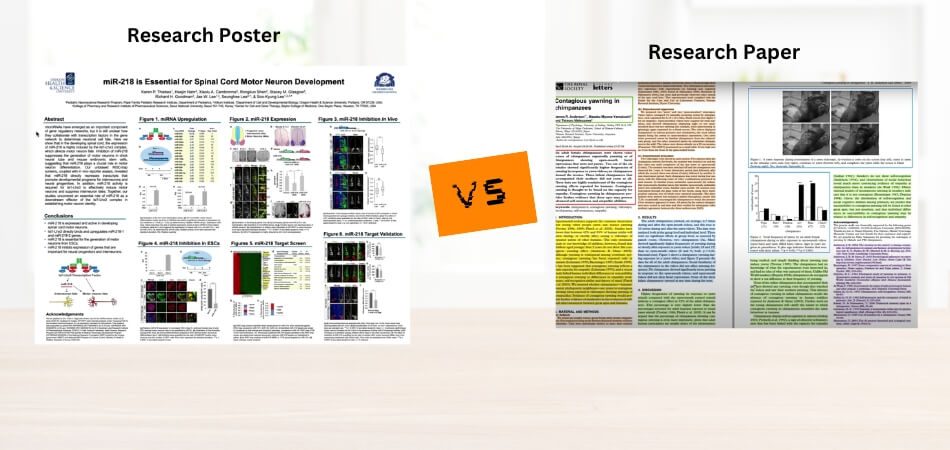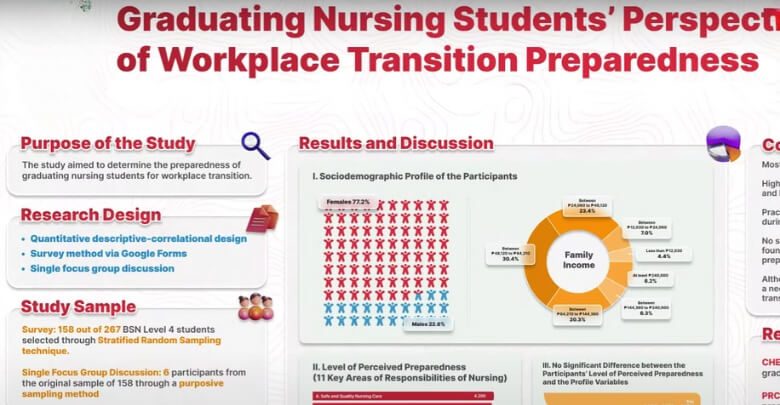Research plays a vital role in expanding our understanding of complex subjects, driving innovation, and sparking progress across fields. Whether uncovering new findings or challenging established theories, research fuels academic and real-world advancements.
When it comes to sharing research findings, many wonder, what is the difference between a research paper and a research poster? While both formats aim to communicate research insights, they differ significantly in format and purpose.
A research paper is a detailed document with a formal structure, written for academic publication. Meanwhile, a research poster offers a concise, visually engaging snapshot, ideal for quick presentations and interactive discussions at conferences.
Read on to explore these distinctions in more depth and discover which format best fits your research goals.
Why is Research Important for Your Career Growth?
Research plays a crucial role in career development, offering numerous benefits that can enhance professional growth. By engaging in research, individuals gain valuable skills, knowledge, and networks that are vital for success. Understanding the importance of research can help professionals shape their careers effectively and meaningfully.
Enhancing Knowledge and Expertise
Engaging in research allows individuals to deepen their understanding of specific fields. This process cultivates critical thinking and analytical skills, which are essential for problem-solving. As professionals explore new ideas and theories, they build a foundation of knowledge that sets them apart. The more informed you are, the more confidence you can bring to discussions and decision-making.
Building a Professional Network
Conducting research opens doors to valuable connections within your industry. Collaborating with other researchers develops relationships that can lead to mentorship opportunities. Networking becomes more impactful when you attend conferences to showcase research, allowing you to meet industry leaders. A strong network can provide support and open doors to new career prospects.
Developing Transferable Skills
Research activities cultivate a variety of transferable skills that enhance employability. Skills such as project management, communication, and data analysis become second nature through hands-on experience. These abilities are applicable across numerous job sectors and can be a selling point in interviews. Employers often seek candidates who demonstrate a solid skill set cultivated through research.
Staying Current with Industry Trends
The dynamic nature of research helps professionals stay updated with the latest trends and advancements. Engaging in ongoing research ensures that you are aware of emerging technologies and methodologies. This awareness is crucial for adapting to changes within your field, keeping you relevant and competitive. Continuous learning through research can lead to innovative ideas that propel your career forward.
Improving Problem-Solving Abilities
Research encourages a systematic approach to problem-solving, which is vital in any career. By analyzing data and drawing conclusions, professionals can tackle complex challenges effectively. This analytical mindset not only enhances individual performance but also contributes positively to team efforts. As you develop these skills, you will find yourself better equipped to get through workplace obstacles.
What Is the Difference Between a Research Paper and A Research Poster?
Research papers and research posters differ greatly, which is essential for academics and professionals. There is a distinct purpose and audience for each format, which contributes to the dissemination of knowledge in a different way. A comparison like this reveals key characteristics, enabling researchers to select an appropriate method for effectively presenting their findings and ensuring impactful communication.
| Criteria | Research Paper | Research Poster |
| Length and Detail | Research papers are comprehensive documents covering topics in depth and are usually lengthy. | Research posters offer concise, visually oriented presentations that highlight key findings quickly. |
| Structure | They follow a formal structure with sections like introduction, methodology, and conclusion. | Posters use bullet points, charts, and images to summarize the main points clearly and effectively. |
| Purpose | The goal is to contribute significant findings to a field, often for publication in journals. | Their purpose is to facilitate quick communication of research findings during conference presentations. |
| Audience | They primarily target researchers, academics, and professionals seeking detailed analysis of the topic. | Posters aim at conference attendees, allowing for interactive discussions and immediate feedback on research. |
| Review Process | Research papers typically undergo a rigorous peer review process ensuring their quality and credibility. | Posters may have a peer review process for acceptance, but it is usually less rigorous than for papers. |
Both research papers and posters play vital roles in sharing knowledge. Recognizing their differences enables researchers to select the most effective format for their work, enhancing communication and engagement within the academic community and beyond.
When to Choose Research Papers?
Choosing to write a research paper is a significant decision in the academic journey. These papers serve as detailed explorations of specific topics, contributing valuable findings to the field. Understanding when to select this format can enhance your research impact and effectiveness.
In-Depth Analysis Required
A research paper is ideal when a comprehensive analysis of a topic is necessary. This format allows for a thorough exploration of theories and methodologies, which is crucial for significant contributions. When the subject demands extensive literature reviews and critical discussions, a paper becomes essential. Such depth enhances the validity and credibility of your research.
Publication Goals
If your aim is to publish findings in academic journals, a research paper is the right choice. Many journals prioritize detailed studies that meet rigorous standards for publication. Research papers provide the structure and depth required to fulfill these academic expectations. Therefore, aligning your work with publication goals can significantly influence your choice.
Addressing Complex Issues
When tackling complex or multifaceted research questions, a paper offers the space needed for detailed examination. This format allows for nuanced discussions, helping clarify intricate ideas for your audience. For instance, utilizing conference papers for research can lead to the development of a more extensive paper. A well-structured paper can address challenges in a systematic and articulate manner.
Requirement for In-depth Review
Selecting a research paper format is beneficial when strict peer review is necessary. This review process enhances the quality and credibility of your work through expert feedback. Scholars often favor papers that have undergone a comprehensive review, as this signifies reliability. Engaging in this process not only improves your research but also elevates your professional standing.
When to Choose Research Posters?
Research posters serve as an excellent medium for presenting findings in various settings, especially during conferences. Choosing to create a research poster can enhance communication and engagement with your audience. Understanding when to opt for this format can significantly impact the effectiveness of your research dissemination.
When Presenting at Conferences
Looking for a research poster is ideal when participating in academic conferences or symposiums. These events provide a platform for showcasing research to peers and experts in your field. Posters allow for quick communication of essential findings, inviting interactive discussions. Attendees often appreciate the visual aspect, which makes complex information more accessible.
For Engaging with Diverse Audiences
Selecting a poster format becomes beneficial when addressing a varied audience with different expertise levels. Posters simplify complex topics into easily digestible information, making them approachable for all. They can spark interest and facilitate dialogue among attendees who may not be specialists. Engaging with a broader audience enhances the reach and impact of your research.
To Encourage Immediate Feedback
Using a research poster allows researchers to receive immediate feedback on their work during presentations. This format invites questions and discussions that can lead to valuable insights. Engaging in real-time conversations often reveals new perspectives and suggestions for improvement. Immediate feedback helps refine research ideas and strengthens future projects.
When Time is Limited
Choosing a poster is advantageous when time constraints limit the depth of presentation possible in other formats. Posters convey essential information quickly, making them suitable for fast-paced environments. Researchers can summarize key points without overwhelming their audience with details. This efficiency can be particularly useful in busy conferences with numerous presentations
Pros and Cons of Using Research Papers
Research papers are essential tools for disseminating in-depth knowledge and findings within academic fields. They offer a structured way to present complex ideas, making them valuable for scholars and practitioners alike. However, like any format, research papers come with both advantages and disadvantages.
Pros of Using Research Papers
- They provide comprehensive analyses of specific topics, contributing to a deeper understanding of the subject.
- A formal structure enhances clarity, guiding readers through the research process effectively.
- The peer review process ensures high-quality, credible findings that advance knowledge in a field.
- Research papers allow authors to showcase their expertise, enhancing their professional reputation and academic profile.
- They facilitate extensive literature reviews, placing new research within the context of existing studies.
- Publication in reputable journals can increase visibility and citation opportunities for researchers.
- These papers often attract funding opportunities and collaborations based on demonstrated expertise.
Cons of Using Research Papers
- Writing a research paper can be time-consuming, requiring significant effort and dedication.
- The formal structure may limit creative expression and innovative presentation of ideas.
- Accessibility can be an issue, as many papers are published in journals behind paywalls.
- Strict peer review processes can lead to long publication timelines, delaying the dissemination of findings.
- Not all research papers gain attention, leading to the potential undervaluation of significant work.
While research papers play a crucial role in academic communication, they come with both benefits and drawbacks. Weighing these pros and cons can help researchers decide the best format for their work. Understanding these factors will lead to more informed choices about how to share their findings effectively.
Pros and Cons of Using Research Posters
Using research posters is a popular way to present findings, especially at conferences. They offer a visual and engaging format that can attract attention and encourage discussion. However, like any presentation method, there are both advantages and disadvantages to consider.
Pros of Using Research Posters
- Visual elements can simplify complex information, making it easier to understand.
- They invite interaction, fostering discussions with attendees and experts.
- Posters can be displayed in high-traffic areas, increasing visibility.
- Quick communication of key findings saves time for both presenters and viewers.
- Immediate feedback from peers can lead to valuable insights and improvements.
- Posters often require less preparation time compared to formal presentations.
- They allow researchers to highlight creative and innovative aspects of their work.
Cons of Using Research Posters
- Limited space can restrict in-depth explanations of research methodologies.
- Visual designs may distract from essential information if not executed well.
- Audience engagement can vary, leading to a potential lack of interaction.
- Presenters may not have control over the viewing environment and conditions.
- Feedback can sometimes be superficial or not as thorough as desired.
Research posters offer numerous benefits while also presenting certain challenges. They can enhance communication and engagement in academic settings but may not suit every research topic. Understanding the pros and cons allows researchers to make informed choices about how to present their work effectively.
Tips for Choosing the Right Format for Your Next Conference
Selecting the right format for presenting your research at a conference is crucial for effective communication. Each format has its strengths and limitations, which can impact audience engagement and understanding. Here are some tips to help you choose the most suitable presentation method for your next conference.
Know Your Audience
Understanding who will attend the conference is essential for making an informed decision. Consider the audience’s background, expertise, and interests to customize your presentation. Engaging an audience of experts may require a more in-depth approach. For a general audience, a simpler, more visual format could be more effective.
Assess Your Research Findings
The complexity of your research findings plays a significant role in your format choice. If your study involves detailed methodologies and results, a research paper may be more suitable. Conversely, if you have concise and clear results, a poster can effectively highlight those points. Evaluating the nature of your findings helps determine the best way to present them.
Consider Time Constraints
Evaluating the time you have for preparation and presentation is crucial. Posters often require less preparation time than full papers, making them more appealing for tight schedules. If you have ample time and detailed content, consider choosing a paper format. Balancing time constraints with content depth ensures a well-prepared presentation.
Think About Visual Elements
Incorporating visuals can greatly enhance your presentation and audience engagement. Posters allow for the effective use of charts and images to convey information. If your research lends itself to striking visuals, a poster may be ideal. On the other hand, detailed graphs and figures may be better suited for a research paper.
Determine Your Goals
Identifying your primary objectives for attending the conference is vital. If you aim to generate immediate discussions and feedback, a poster format could work well. Choosing between journal and conference publications also depends on your long-term goals for disseminating your research. Clarifying your goals can guide your format selection process.
Evaluate Venue and Session Format
The conference venue and session format can influence your presentation choice. Some conferences may have specific sessions designed for oral presentations or poster sessions. Understanding the structure of the event can help you determine which format aligns best with your needs. Adapting to the venue’s requirements enhances your chances for effective communication.
Frequently Asked Questions About What is the Difference Between a Research Paper and a Research Poster?
Understanding the distinctions between a research paper and a research poster can be beneficial for academics and researchers. Both formats serve unique purposes and are designed for different audiences. Here are some frequently asked questions to clarify their differences.
What is the Primary Purpose of a Research Paper?
The primary purpose of a research paper is to contribute substantial findings to a specific field of study. It allows researchers to share detailed analyses and methodologies with their peers. These papers often undergo strict peer review before publication in academic journals.
What is the Main Objective of a Research Poster?
The main objective of a research poster is to present key findings succinctly at conferences. It aims to facilitate quick communication and discussions, allowing for immediate feedback from attendees. Posters encourage interaction and engagement among a diverse audience.
How is the Audience Different for Each Format?
Research papers primarily target fellow researchers, academics, and professionals seeking detailed analysis. In contrast, research posters engage a broader audience, including conference attendees from various backgrounds. This difference influences the complexity and depth of the information presented in each format.
What Are the Key Structural Differences?
Research papers follow a formal structure with sections like abstract, introduction, methodology, and conclusion. Research posters, however, use a more visual format, summarizing key points with bullet points, charts, and images. This structural difference affects how information is conveyed.
How Does the Review Process Differ?
Research papers typically undergo a strict peer review process to ensure quality and credibility before publication. Research posters may also have a review process for acceptance at conferences, but it is generally less stringent. This difference impacts the level of scrutiny each format receives.
Wrap Up
In wrapping up, it’s clear that research is a cornerstone for career growth, offering opportunities to enhance knowledge, build networks, and develop valuable skills. Choosing the right format to present your findings is crucial in maximizing their impact.
Understanding what is the difference between a research paper and a research poster is essential in making this decision. While research papers allow for in-depth analysis suitable for publication, research posters offer a concise, visual means of engaging with a broader audience at conferences.
By carefully considering your goals, audience, and the nature of your research, you can select the format that best showcases your work and advances your professional journey.








